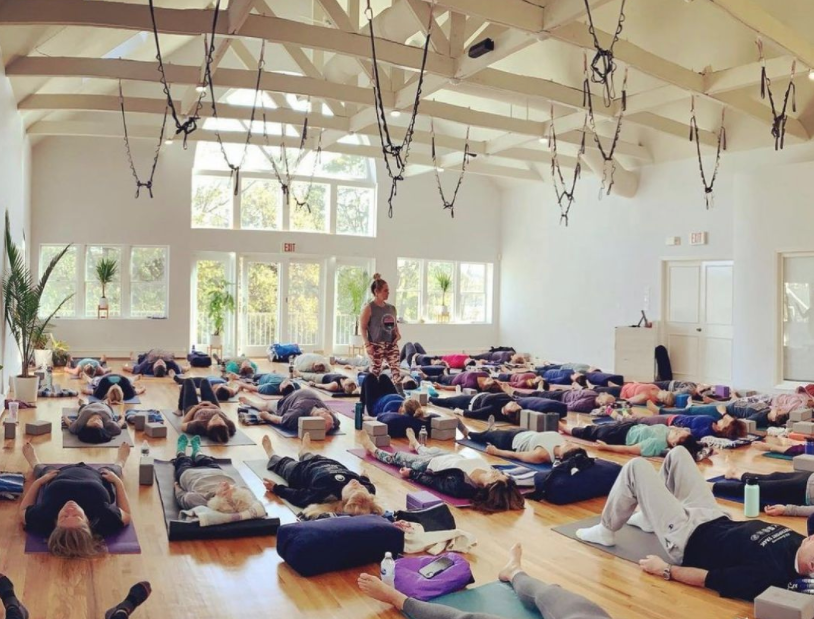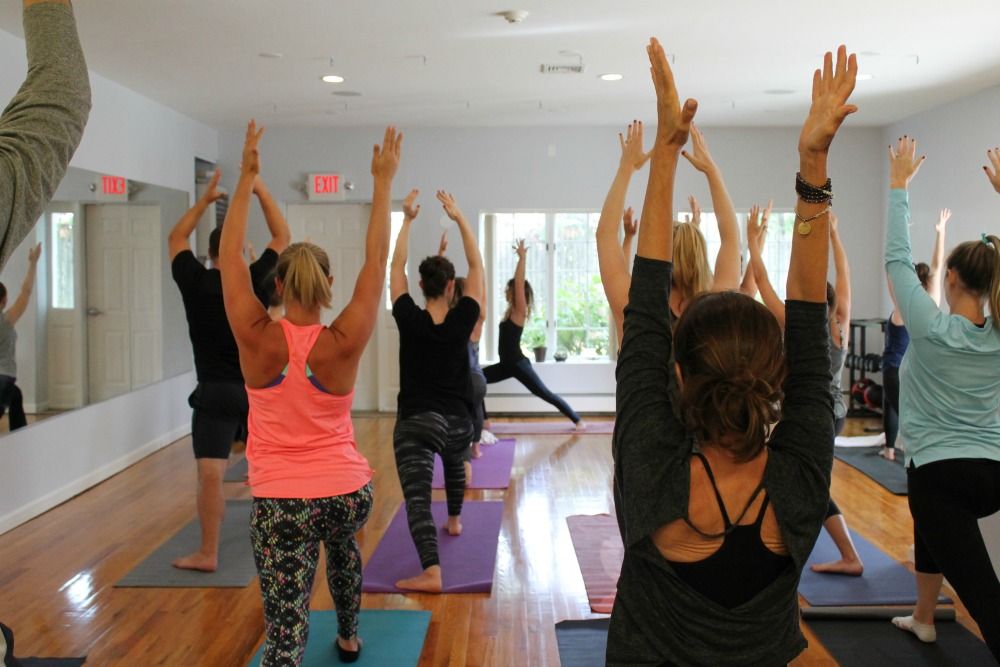10 Tips For Getting Healthy from SOUND Body & Mind
Guest blog by Huntington residents and business owners Adam and Jill Levy of SOUND Body & Mind, a Yoga, Fitness and Nutrition studio. Located at 125 West Shore Road, Huntington.

photo courtesy of SOUND Body & Mind
1. Eat Real Food
Generally speaking, if it comes in a box or a bag, try to avoid it. Vegetables come in a bag sometimes, that’s obviously OK. Just focus on eating more one-ingredient foods, along with reducing intake of things that require a long list of additives. Too many packaged foods can increase intestinal permeability (also called “leaky gut”) which kicks off a chain reaction of inflammation.
2. Move your body
The body is made for moving, so first and foremost work on sitting less. Around 80% of adults fail to meet the minimum daily recommendation for exercise! Most adults should get at least 2.5 hours of moderate aerobic activity (such as brisk walking or even gardening) or 75 minutes of vigorous aerobic activity a week. Ideally try a combination of both, such as alternating days of cardio with exercise focusing on flexibility, building strength, or enhancing endurance. Here are some workout options: Classes at Sound Body & Mind
3. Drink Lots of Water
Every day you lose water through your breath, perspiration, and by going to the bathroom. For your body to function properly, you must replenish its water supply by drinking lots of water and eating hydrating foods. Follow the “8x8 rule”, aiming for at least eight 8-ounce glasses of water, herbal tea (great in the winter time), or decaffeinated drinks per day.
photo courtesy of SOUND Mind & Body
4. Get Sufficient Sleep
The amount of sleep you need depends on various factors, like how much you exercise, your age and even genetics. Adults should try to get between 7-9 hours of sleep every night to feel their best, but many consistently fall short of this goal. Poor sleep habits can lower immune function and put you at greater risk for health problems, including weight gain or obesity, high blood pressure, depression and diabetes just to name a few.
5. Eat More Veggies
The average American eats only 1-2 servings of vegetables each day, but ideally we should get about 4-5 servings. Veggies fill you up, providing fiber and loads of nutrients such as antioxidants, all for very little calories. Variety is key, so try to “eat the rainbow” by choosing different kinds.
6. Cut Out the Sugary Drinks
One can of soda or one bottle of iced tea can have around 30-40 grams of sugar (that’s a whopping 10 teaspoons of sugar per small drink!). Imagine how that adds up if you are drinking more than one sweetened drink per day. Replace those sugary, or artificial “diet” drinks with water (see tip #3). If you like a cold, carbonated beverage, try seltzer with a small splash of juice or some fresh lemon/lime.
7. Be Mindful
Being mindful means focusing your attention (“awareness”) on what’s going on in the present moment, rather than ruminating over the past or worrying about the future. Mindfulness practices, such as meditation or practicing mindful eating have been linked to numerous health benefits, ranging from reduced anxiety and weight gain, to improved sleep and mental performance.
8. Get Outdoors
Get some fresh air and a healthy dose of Vitamin D by spending time outside every day, including in the sun. Sunlight gets a bad rap, but it’s the single best way to get the vitamin D you desperately need (your skin actually produces vitamin D when exposed to direct sunlight for about 15-20 minutes). Time spent in nature, along with getting enough sunlight, has been linked with the prevention of diabetes, auto immune disorders, multiple sclerosis, and heart disease. A high percentage of adults are believed to be vitamin D deficient, which is one reason getting outside can also lessen the impact of stress, improve eye health, sleep quality and your mood.
9. Stretch Your Body
Stretching helps keep your muscles active and healthy, along with your joints flexible and strong. Flexibility is important for maintaining proper range of motion in the joints and preventing injuries. Without it, your muscles shorten and become tight. Then, when you need those muscles for activity, they are weak and unable to extend as far as you need. For exercise, use dynamic stretches that focus on quick movements that increase body temperature and heart rate to prepare for the workout. After your workout hold stretches for 25-30 seconds before releasing. Stretching after a workout will help to reduce muscle fatigue.
10. Manage Your Stress
Believe it or not, between 80-90% of doctor’s visits are directly or indirectly linked to stress. Stress is more than just a feeling in your head, it effects your entire body - including lowering immune function, interrupting sleep, causing muscle tension and complicating digestion to name a few. Research suggests that less-stressed individuals tend to live longer, healthier lives. Different things work for different people, but many find stress-relief from yoga, exercise, meditation, getting outdoors and deep-breathing techniques.





